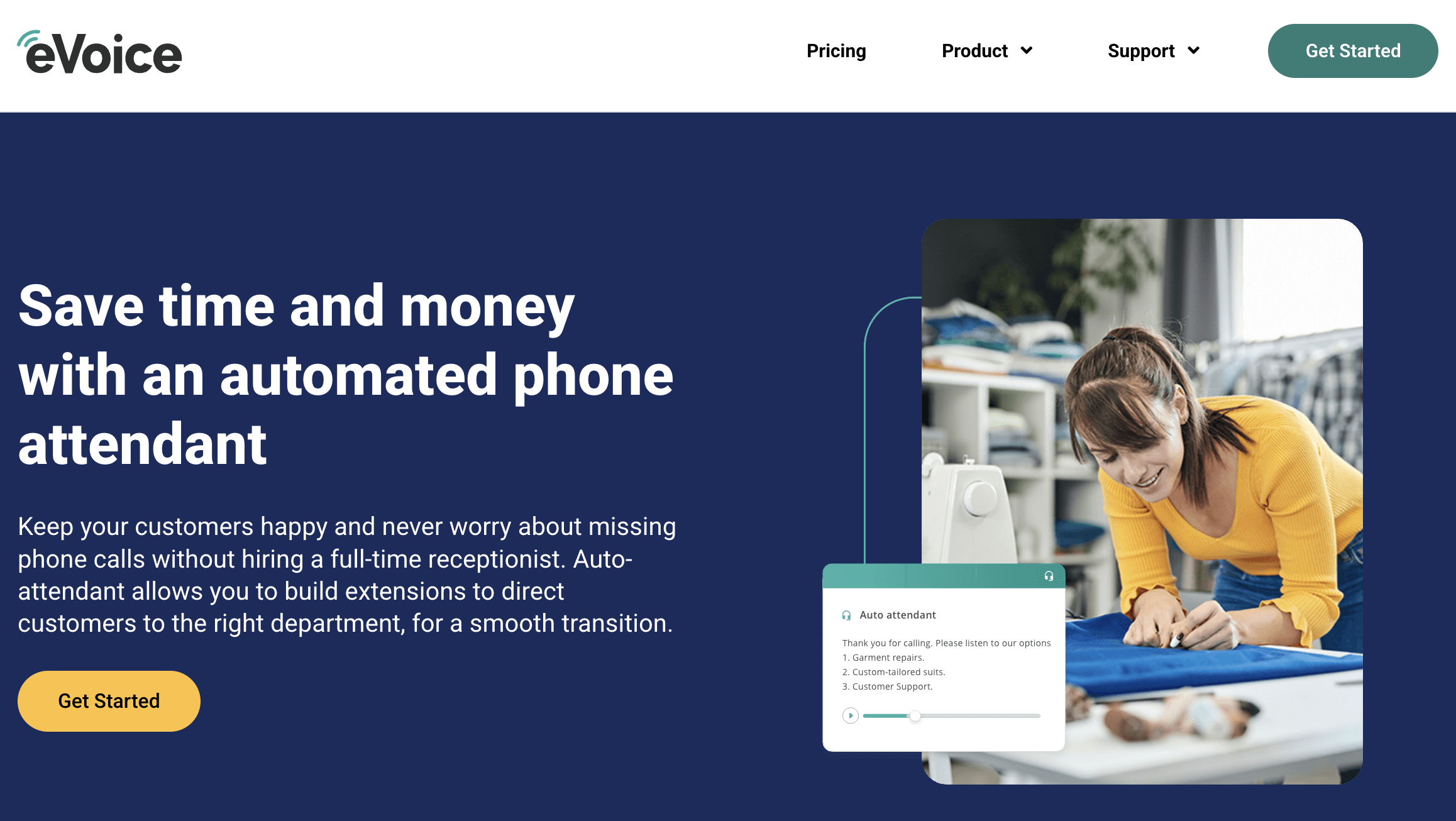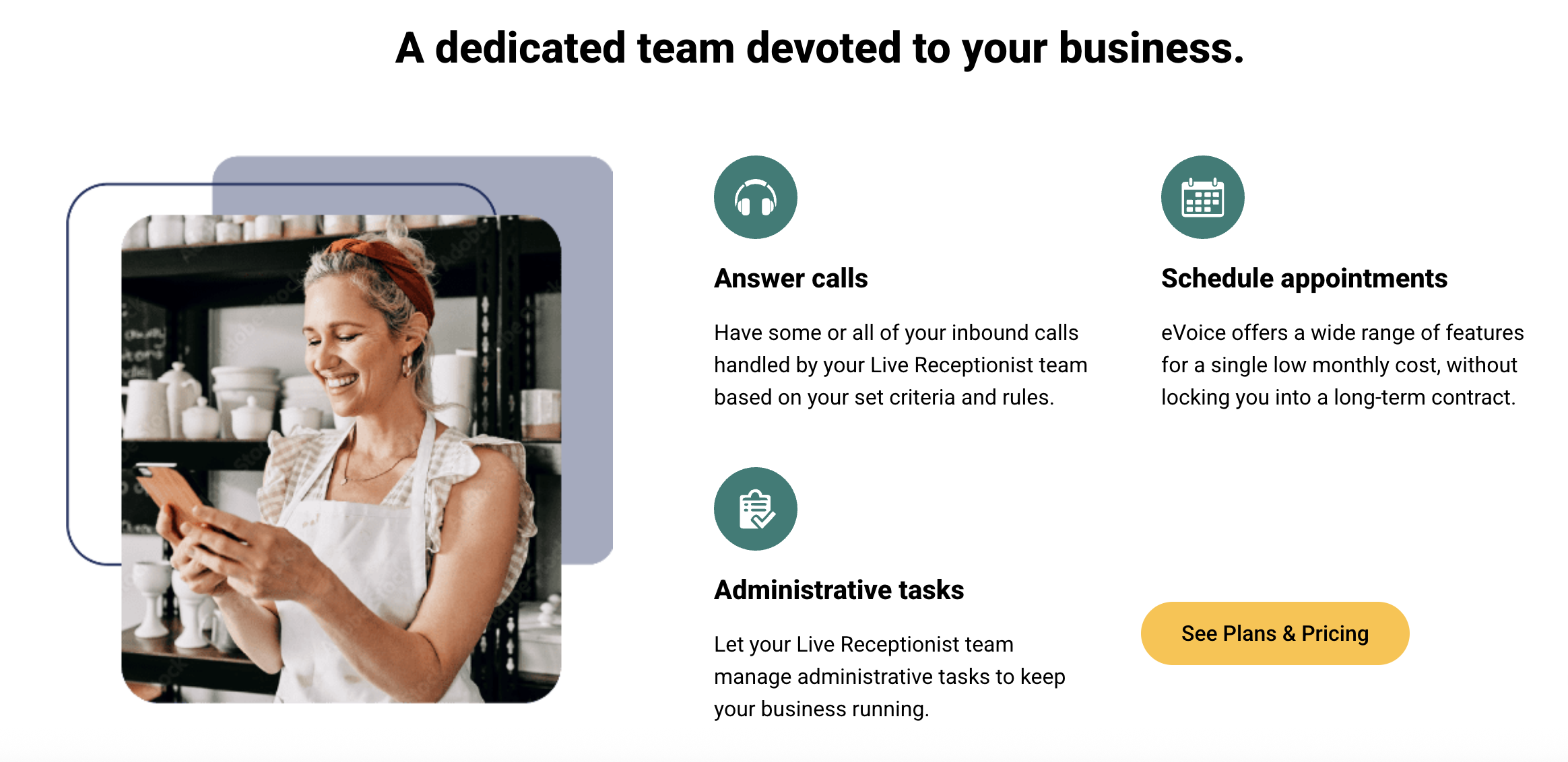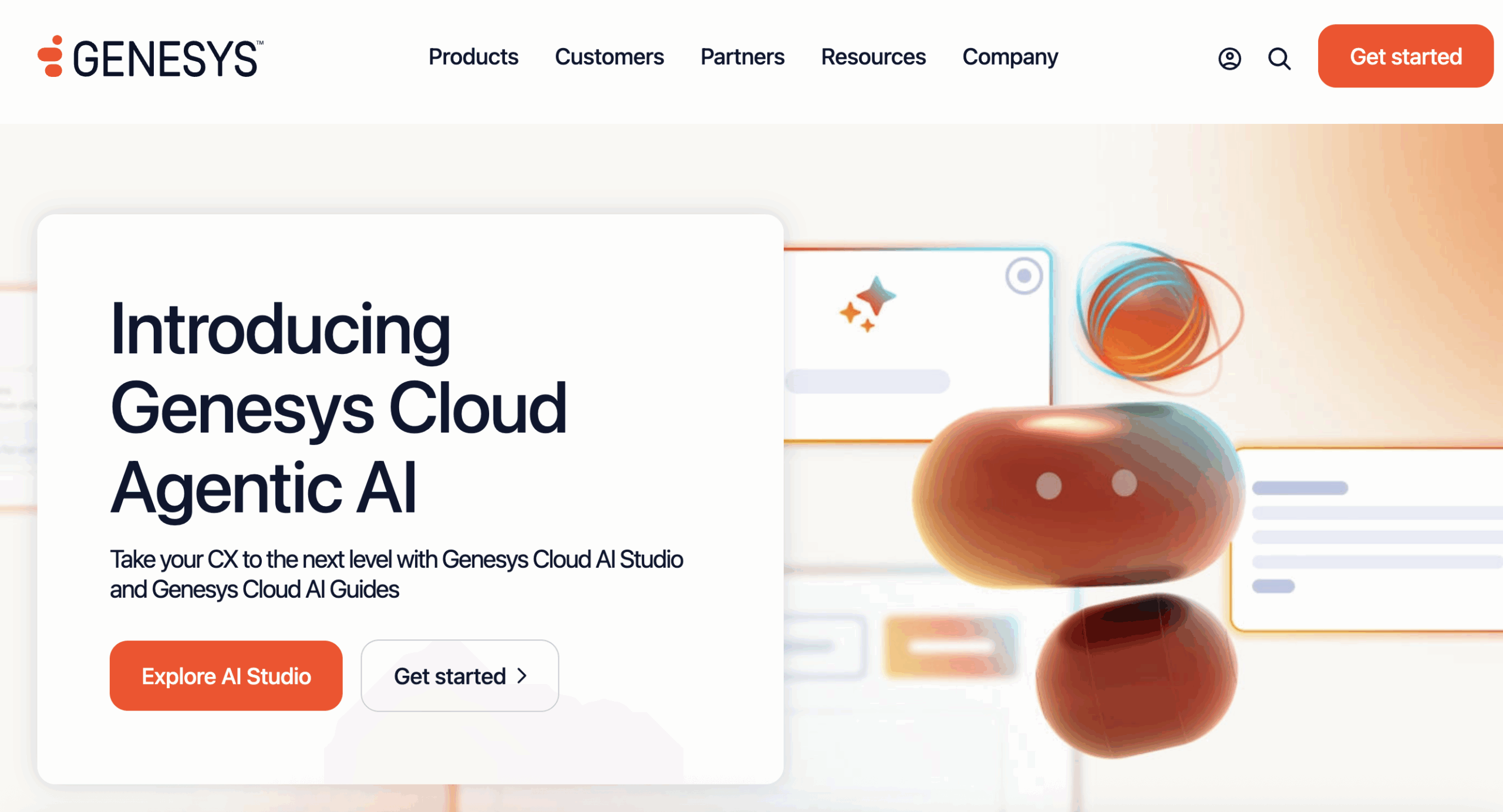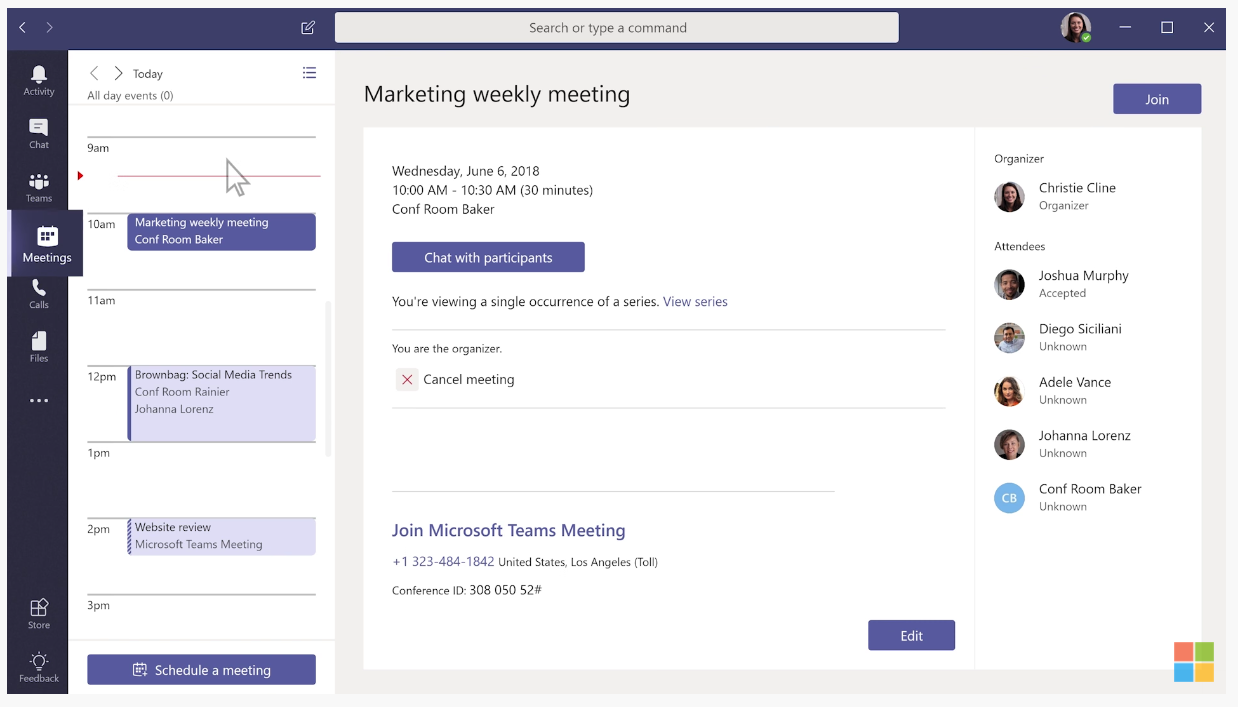Some phone calls to your business don’t require a live receptionist. A well-built automated answering service can greet callers, answer common questions, and route people to the right place without putting anyone on hold. We evaluated the leading options for small businesses and found that Nextiva is the best choice for most teams thanks to its intuitive call-flow builder, scalable feature set (including AI-assisted routing on higher tiers), and strong overall value.
The Best Automated Answering Service for Most Small Businesses
Even if your company is small today, your call volume and complexity can change quickly. Choosing a platform like Nextiva that scales—from a simple auto attendant to robust voice, video, messaging, and AI tools—helps you avoid disruptive migrations later.
Nextiva’s virtual receptionist is easy to configure in the web portal or mobile app. Build multi-level menus, set business-hours rules, route by department or skill, and play tailored greetings by caller path. You also get essentials like voicemail transcription, popular CRM integrations, and unlimited domestic calling on eligible plans—so you’re not paying extra for the basics as you grow.
The 6 Best Automated Answering Services for Small Businesses to Consider
- Nextiva – Best automated answering service for most small businesses
- RingCentral – Best for an all-in-one business phone suite
- Vonage – Best for mix-and-match add-ons and flexible setup
- Ooma – Best value virtual receptionist on entry-level plans
- eVoice – Best for simple, user-friendly department routing
- Genesys – Best for AI-powered routing and enterprise-grade scale
When It Makes Sense to Invest in Automated Answering Services
For many small businesses, the trade-off is time versus cost. If a meaningful part of your day goes to answering routine calls, you’re paying an opportunity cost in productivity.
Automated answering systems greet callers, present clear menu options, and route people to self-serve answers or the right extension. Some support speech recognition (saying “sales” or “pay my bill”), while others use keypad input for simple navigation.
With the right setup, you’ll reduce hold times, cut down on transfers, and give your team more focus time—without sacrificing caller experience.
Good signs it’s time to implement one include: frequent after-hours calls, repeat questions (hours, directions, billing), missed calls during busy periods, multiple locations or departments, multilingual callers, or a distributed/remote team.
If you only get a handful of inbound calls a day, your current approach may be fine. But most growing teams benefit from the consistency, reporting, and time savings of an auto attendant.
Top providers offer flexible month-to-month or annual billing and tiered features, so you can start small and expand when you need more advanced routing, analytics, or AI.
Automated Answering Services Reviews
#1 – Nextiva — Best for Most Small Businesses
Nextiva combines an intuitive auto attendant with a full cloud phone suite. Configure greetings, business-hours rules, ring groups, and multi-level menus in minutes. You can also route by department, skill, or time zone and offer different experiences for new versus returning callers.
Set up once and let it run: publish hours and directions, route to self-service options (like “pay my invoice” or “reset password”), and send escalations to the right on-call or queue. Advanced tiers add AI enhancements, analytics, and deeper integrations as your needs grow.

With Nextiva’s virtual receptionist, you can handle daytime and after-hours calls without a live operator. Add FAQs to reduce transfers, or route VIPs and repeat callers to priority queues. Custom greetings per menu and schedule help smaller firms present a polished, enterprise-style experience.
Smart routing lets you prioritize callers (for example, known clients) or fast-track high-value numbers to specialist teams. Admins can manage everything from a clean web portal or the Nextiva mobile app.
Beyond the auto attendant, Nextiva scales into full unified communications—voice, video, chat, and team collaboration. Depending on your plan, you’ll also get:
- Voicemail transcription and visual voicemail
- Call forwarding, park, and transfer
- Caller ID and call recording
- SMS/MMS and team chat
- Hold music and custom announcements
- Call and hunt groups, plus analytics
In short, it covers the essentials now and leaves room for advanced workflows later.

Pricing is competitive for small teams and typically includes unlimited domestic calling, internet fax, call history/logs, and access to the Nextiva apps. Mid-tier plans unlock multi-level call menus and more sophisticated routing—ideal if you operate multiple departments or locations. For deeper details, see our full Nextiva review.
Support is available 24/7, which is a big plus when you’re configuring menus or making after-hours changes.
Try Nextiva to build a professional, scalable call experience without hiring a receptionist.
#2 – RingCentral — Best for Comprehensive Business Phone Services
If you’re replacing your entire phone system, RingCentral (RingEX) offers robust auto-attendant tools plus messaging, video meetings, analytics, and AI in one platform.
Its multi-level auto attendant supports advanced routing and schedules (after-hours, holidays, lunch breaks). You can create separate profiles per department or location and build up to hundreds of sub-menus for complex org charts without confusing callers.

Highlights include a dial-by-name directory, external number routing, location-aware call flows, and a visual editor that makes complex trees easy to maintain. A built-in validator flags broken paths before you publish changes.
Beyond voice, RingCentral adds voicemail-to-text, toll-free options, call analytics, call recording, and CRM integrations on eligible tiers. Teams can move seamlessly between desktop and mobile apps for calls, chat, and meetings.

RingEX plans with multi-level auto attendants are widely available, with annual and monthly billing options. If you want a single vendor for phones, messaging, and video, RingCentral is a strong contender.
#3 – Vonage — Best for Customizable Phone Service Plans
Vonage is built for flexibility. Its Premium and higher tiers include a multi-level auto attendant, and the admin portal makes it easy to drag-and-drop schedules, menus, and greetings without IT support.
Create special rules for holidays, emergencies, or short closures so callers get accurate info and options even when your team is unavailable. Vonage also bundles 40+ phone features, caller-ID tools, voicemail to email, and click-to-dial—with optional add-ons so you pay only for what you need.

All plans include Vonage Meetings for voice/video collaboration and team messaging across desktop, web, and mobile—handy for distributed teams.

Vonage’s Premium tier (the one with multi-level auto attendant) is a good sweet spot for small teams that want a polished caller experience plus CRM integrations without going enterprise-grade.
Explore Vonage to mix core features with the add-ons that matter to you.
#4 – Ooma — Best Value Virtual Receptionist
Ooma is a straightforward, budget-friendly business phone system. Every Ooma Office plan includes a virtual receptionist for professional greetings and smart routing—features that used to require enterprise hardware.
Customize menus by time of day or day of week, and route callers to specific people, departments, or voicemail without making them wait. You can also offer multilingual menus to serve more callers seamlessly.

With multi-ring to desk phones, the mobile app, and external devices, you can answer from anywhere. Entry plans are inexpensive, and higher tiers add useful extras like video conferencing, call recording, caller-info match, and voicemail transcription.
Get started in minutes, and keep your existing number during setup.
#5 – eVoice — Best for User-Friendly Department Routing
eVoice makes it simple to spin up an auto attendant and dial-by-name directory so callers reach the right person fast—even if they don’t know an extension.
It’s fully virtual—no hardware required—and the mobile app turns your phone into a business line with voicemail transcription, business texting, and fax support.

Alongside the auto attendant you get call forwarding, custom greetings, conference calling, call screening, recording, and speed dial—all managed from a unified message center that stays synced between web and mobile.

Pricing is refreshingly straightforward and month-to-month remains affordable if you don’t want a long-term commitment. There’s also a 30-day money-back guarantee for extra peace of mind.
If you need ten or more lines, eVoice can build a custom plan for more complex routing.
#6 – Genesys — Best for AI-Powered Predictive Routing
Genesys serves SMBs up to global enterprises with its CX Cloud platform. Every voice plan includes a speech-enabled IVR so a bot can answer, resolve common needs, or hand off with context using predictive routing to the best agent.
Genesys stands out for its AI capabilities: turnkey models, agent copilots, and rich analytics help you improve call flows continuously. It can stitch together a caller’s journey across channels so automations and agents respond with full context.

Pricing is tiered by capability (voice-only through full omnichannel + workforce engagement). AI features are available via included allowances and add-on tokens depending on your license. If you need contact-center-grade reporting, forecasting, and QA along with your auto attendant, Genesys is purpose-built for that.
Methodology: How We Chose the Best Automated Answering Services
We focused on small-business priorities: easy setup, clear pricing, strong routing, and the ability to grow without switching tools. The most important criteria we used are below, with practical tips to evaluate each one.
Multi-Level Call Attending
Single-menu systems are fine for very simple teams. As soon as you have multiple departments, locations, languages, or escalation paths, you’ll want multi-level menus and sub-menus. Look for drag-and-drop builders, per-menu greetings, and reusable schedules to keep things tidy.
Pro tip: sketch your menu on paper first. Keep level-1 choices under five options, add “0 = operator,” and offer a quick path for existing customers (like account PIN or callback). Reserve level-2 for niche needs (e.g., “press 4 for vendor deliveries”).
Account & Call Monitoring
Your admin dashboard should make routine changes painless—adding users, updating greetings, publishing holiday hours, or redirecting calls during outages. Prefer providers with visual editors and real-time validation that catches broken routes before you go live.
Mobile apps are a plus for quick changes on the go. Look for searchable call logs, queue metrics, and missed-call alerts so you can plug gaps fast.
Optional Live Call Answering
Some callers just want a human. Make sure your system can route to a live operator or external answering service when needed, even if most interactions are automated. The option to overflow to agents during spikes is invaluable.
Flexible Hours & Schedules
You should be able to set business hours, lunch breaks, and holiday schedules—and map each to different greetings and options. Bonus points if you can trigger emergency or weather closures with one click.
Additional Business Phone Features
Choose a plan that fits today but has headroom for tomorrow. Useful extras include:
- Web and mobile chat
- Post-call surveys and callbacks
- Voicemail transcription
- Call recording and quality monitoring
- CRM integrations (e.g., Salesforce, HubSpot)
- Interactive voice response (IVR) and AI-assisted routing
If you sell by phone, recordings are gold for coaching. Just be sure your team understands consent rules in your state or country before you hit record.
Conference & Video Calling
As more teams go hybrid, bundling conferencing with your phone system can simplify billing and user training. High-quality video or screen-share is essential for demos and client updates; don’t settle for jitter or low resolution.
If you’re a solo operator who rarely meets with groups, you can skip advanced meeting features and keep costs down.
Expanding Your Knowledge: Best Automated Answering Services For Small Businesses
Nextiva is the best automated answering service for small businesses. It’s a complete business phone system that comes with a multi-level auto attendant and virtual receptionist. Businesses can create custom greetings, add hours, and create custom rules for call routing.
For small businesses with multiple departments, Nextiva’s automated answering service ensures that calls are routed to the right person without the need for a real receptionist to answer the phone. If calls come in after hours, on holidays, or on weekends, callers will have the option to leave a voicemail.
Automated answering services come with many of the best business phone systems, which start around $20 per user per month. In some instances, you may need to select an upgraded plan tier to access answering service features, like an auto attendant or virtual receptionist. This can add roughly $5 or $10 per month to your total cost per line.
Lots of entry-level VoIP plans come with basic call routing, voicemail, and virtual receptionist capabilities. But for complex routing trees and multi-level department rules, you may need to select a mid-tier package or higher.
The difference between an automated answering service and an answering machine is that an answering machine only allows callers to leave a voicemail, whereas an automated answering service provides other options, such as routing to a specific person or department or adding business hours.
Automated answering services can even answer common questions from callers without them having to speak with a real person. Answering machines are not as advanced as automated answering services, although all automated answering services will include some type of voicemail or answering machine capability.
The cheapest automated answering service is eVoice. Plans start at $14 per user per month, and you can get two months for free when you sign up for an annual contract.
All eVoice plans come with an auto attendant, custom greetings, call routing, and after-hours call forwarding. Other automated answering services charge more than double the price for these same services. If you sign up for eVoice today, your subscription is backed by a 30-day money-back guarantee.
Summary
An automated answering service can give callers necessary information with helpful, self-served guidance, saving your business time, money, and staff resources.
Of course, your customer service heavily relies on your phone system to do its job.
That’s why we highly recommend Nextiva for most small businesses. Its administrative portal is simple to work with, so you won’t need to be an expert tech to get it running the way you want it to. Plus, you can benefit from an array of extra features you’ll probably need as your business needs expand.
Businesses that only need a once-in-a-while service might prefer Genesys‘s more flexible pricing. On the other hand, companies on the verge of significant growth could enjoy having RingCentral‘s more comprehensive phone system at the ready.
Consider where your business is right now and where you plan for it to go within the next 1-5 years to determine which automated answering service fits the bill.






